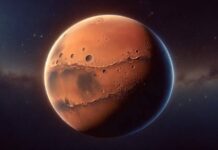Planet Mars. Although there are many projects that aim to take people to the celestial body located at such a great distance from Earth, there are still many question marks regarding the possibility of supporting life there. Well, that's what some researchers are working on, who say that everything could be possible, and that they are developing a special gel that could allow human life to be supported on Mars, although the ecosystem there is a bit hostile to us.
Planet Mars. We are talking about a "silicate airgel", or "frozen smoke", which can be used to increase surface temperatures to ones bearable by humans, even being able to thaw water. This substance is already produced on earth, and is used to insulate the robot that will be sent to the planet Mars in 2020, so it is also tested to see the viability of supporting human life.
Planet Mars. UNEXPECTED announcement about Human Life Support
Planet Mars. The researchers who say they can support human life on the celestial body have reproduced in the laboratory the strange conditions on the planet and tested the substance to see if the theories apply in reality. Experiments of this kind were made because the modification of large areas of the surface of the planet Mars is impossible, so they try to support human life on smaller surfaces, in a much easier way.
"An international team of scientists is proposing to use silicate airgel, sometimes called ice smoke because of its appearance, to heat the surface of the red planet enough to support life and melt frozen water. Airgel is an incredibly lightweight material already produced on Earth and currently used in NASA's Mars robots as insulation."
Planet Mars. The researchers also made computer simulations for their theories, and the result was the same as in the real tests, so that in 2030 we could see astronauts surviving there using this gel. Of course, confirmations from other researchers are also needed before it can be said for sure that human life can be supported without problems on the planet Mars, but what we are learning now shows us that a colonization does not seem impossible.
Planet Mars. NASA would like to send astronauts to the celestial body only in 2030, so we still have a long time to wait until the first person sets foot on the surface of the celestial body.

















